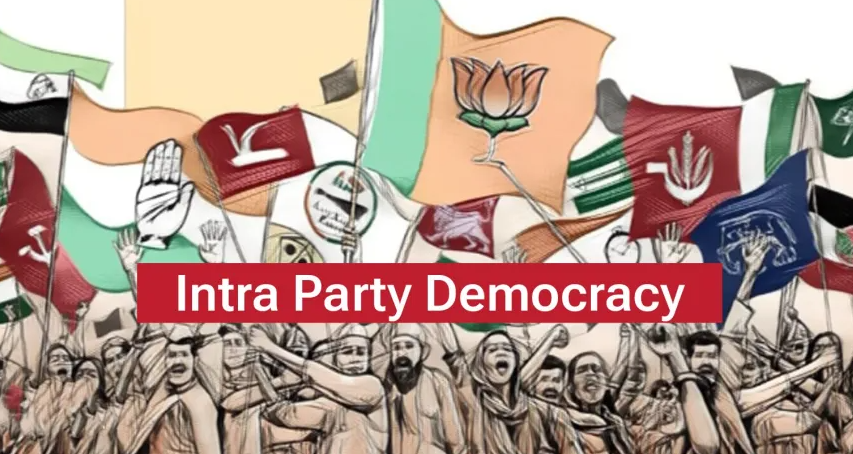Internal Democracy in Political Parties: Challenges and Solutions (GS Paper 2, Polity and Governance)

Context
- India's multi-party democracy is characterized by a diverse array of political organizations.
- However, this diversity often leads to an overemphasis on the charisma of individual leaders, overshadowing the essential democratic processes within the parties themselves.
- The role of the Election Commission of India (ECI) is critical in fostering internal democracy, yet various challenges undermine this goal.
Understanding Internal Democracy
Internal democracy refers to the application of democratic principles within the organizational framework of political parties. It involves:
- Inclusive Decision-Making: Ensuring that all party members have a voice in shaping party policies and strategies.
- Transparent Leadership Selection: Implementing fair processes for electing leaders at all levels, thus preventing centralization of power.
- Accountability Mechanisms: Establishing systems that hold party leaders accountable to their members, fostering a culture of responsiveness and trust.
Reasons for Lack of Internal Democracy
- Weak Organizational Structures: Many political parties suffer from poorly defined internal structures that lack transparency. This leads to a concentration of power within a small leadership group, often undermining the voices of grassroots members.
- Dynastic Politics: The prevalence of dynastic leadership in many parties restricts opportunities for new talent. Leadership roles are often passed down within families, stifling meritocracy and innovation.
- Limited Participation of Members: Intra-party elections are frequently more symbolic than substantive. When members feel that their participation is merely a formality, it leads to disillusionment and disengagement, ultimately weakening the party's grassroots support.
Importance of Internal Democracy
The need for robust internal democracy is paramount for several reasons:
- Nurturing Democratic Values: Political parties that cultivate internal democratic processes are more likely to maintain these values when in power. This can result in greater transparency, accountability, and responsiveness to public needs.
- Leadership Development: Parties structured around democratic principles provide a platform for emerging leaders. Such environments encourage competition and allow younger, capable individuals to rise, bringing fresh ideas and perspectives.
- Empowering Grassroots Members: By fostering a culture of internal democracy, parties ensure that the voices of grassroots workers and ordinary members are considered in decision-making processes. This inclusivity can enhance member loyalty and engagement.
The Role of the Election Commission
The ECI has established several guidelines to promote internal democracy within political parties, primarily through the Representation of the People Act, 1951:
- Periodic Elections: The ECI mandates that parties hold elections for their leadership every five years. This is essential for refreshing leadership and ensuring accountability.
- Opposition to Permanent Leadership: The ECI has made it clear that the concept of a 'permanent president' is counterproductive to the democratic ethos. Leadership should evolve, reflecting the changing dynamics within the party.
- Constitution Requirement: Political parties are required to submit their constitutions when registering, ensuring they have defined processes for internal governance.
Concerns and Limitations
Despite these efforts, the ECI's ability to enforce internal democracy is constrained by several factors:
- De-Registration Powers: The Supreme Court’s 2002 ruling limits the ECI's authority to deregister political parties. The ECI has sought greater powers to enforce internal democracy but has yet to see these proposals implemented.
- Symbolic Compliance: Many parties may conduct elections in name only, leading to a facade of democracy without genuine participation. This can result in internal elections being manipulated by powerful leaders.
The Importance of Technology in Promoting Internal Democracy
The integration of technology into the electoral processes of political parties can significantly enhance internal democracy. Platforms like Right2Vote provide innovative solutions that can streamline the electoral process at various levels:
- National and State Level Management Committees: Right2Vote can facilitate online voting, making it easier and more cost-effective for members to participate in elections, thus enhancing democratic representation.
- District and Local Level Elections: By using eVoting systems, parties can ensure that representatives at these levels are elected democratically, countering the centralization of decision-making.
- Leadership Selection for Chief Ministerial and Prime Ministerial Candidates: Online voting can help parties choose candidates based on the collective will of their members, fostering a sense of ownership and accountability.
- Annual General Meetings (AGMs) and Extraordinary Meetings: Utilizing mobile voting technology can increase member participation, enabling more democratic discussions and decisions.
- Ticket Distribution: Feedback mechanisms enabled by online platforms can democratize the ticket allocation process, reducing internal conflicts and ensuring that candidates are selected based on merit rather than favoritism.
- Manifesto Finalization: Political parties can gather citizen feedback through structured online polls before finalizing their manifestos, ensuring alignment with voter expectations and reducing the risk of backlash.
Path Forward
Enhancing internal democracy is critical for strengthening India’s democratic fabric. While the ECI has taken steps in this direction, there is an urgent need for comprehensive reforms. These could include:
- Legislative Changes: Enacting laws that empower the ECI to enforce internal democracy more effectively, including stricter penalties for non-compliance.
- Increased Transparency: Encouraging parties to adopt transparent processes for leadership selection and decision-making.
- Support for Grassroots Engagement: Developing programs to promote member participation in party activities and decision-making.
Conclusion
- The promotion of internal democracy in political parties is essential for a healthy democratic system in India.
- By leveraging technology and reforming existing processes, the ECI, alongside political parties, can create an environment where genuine democratic practices flourish.
- This will not only strengthen party structures but also enhance public trust in the political system, making it more responsive to the needs and aspirations of the electorate.
- A collaborative effort is vital to fortify the democratic fabric of India, ensuring that all voices are heard and represented within the political arena.


